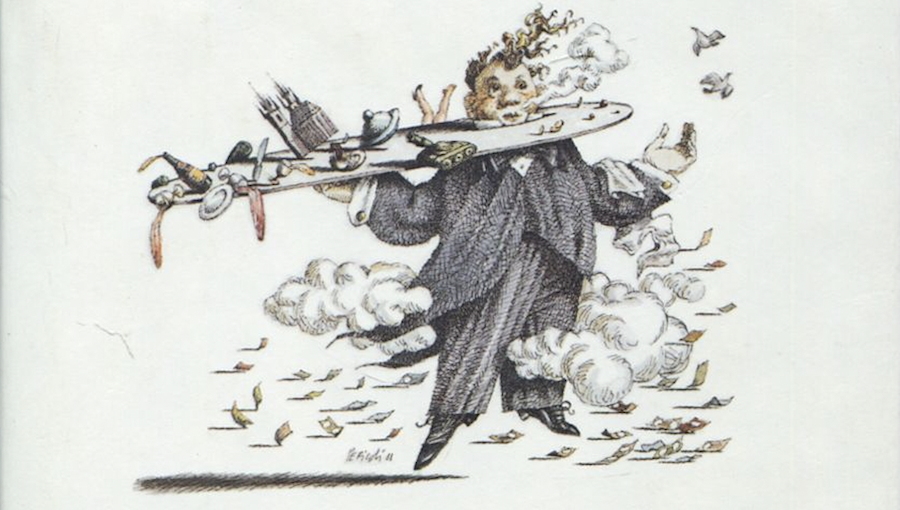The Shadow Self of Domestic Stories: A Reading List of Novels Set in Hotels
Maria Hummel Recommends Karen Tei Yamashita, Cristina García, Bohumil Hrabal, and More
The hotel is the shadow self to the house. Mobility, vulnerability, and strangers versus fixity, protection, and family.
The hotel novel is the shadow self to the domestic novel. Norman Bates’s mother in Psycho versus Marmee in Little Women. The hollow-eyed twins in The Shining versus the heroic siblings in The Lion, the Witch, and the Wardrobe.
As a setting, the hotel is a dream and a lie, an escape and trap. Far more depressing than the murder in Lolita is the endless grind of motel nights afterward, in which Humbert Humbert makes his teenage victim his wife. Over and over, Lo’s stepfather subjects her to a false home, a false family, and a nightmare of domestic bliss.
Daphne du Maurier’s eponymous Jamaica Inn is a funhouse mirror to Rebecca’s gorgeous Manderley. Rebecca unfolds on an estate haunted by a deceased beauty; Jamaica Inn is a gloomy ruin dominated by a pirate of a man.
Writers like hotels for the same reason that we like ships and islands. They are visualizations of an unconventional psyche, un-pin-downable, and out of bounds. Often it’s a rotten psyche, but sometimes it’s promising and magical.
In 1908, E.M. Forster’s A Room with a View laid the foundations for a new kind of novel about women: the geographical journey as the search for love. A Room with a View features the Pensione Bertolini in Florence, where a moneyed English daughter travels and meets men outside of her class and culture. The book’s focus on women’s expanding freedoms makes it an important literary ancestor to many female travel memoirs today, including Wild, Under the Tuscan Sun, and Eat, Pray, Love.
Stephen Millhauser’s 1997 Pulitzer-winning Martin Dressler depicts the rise and fall of a New World entrepreneur who erects the Grand Cosmo, a magnificent hotel complete with artificial moonlight and a rollercoaster inside. Amor Towles’ bestselling A Gentleman in Moscow introduces a count whose Bolshevik government has sentenced him to house arrest at the luxury Hotel Metropol. The Metropol symbolizes the elegant world that Count Rostov has lost; it is also his prison.
If the hotel is shadow self to the house, the grand hotel is the shadow self to the castle, its opulence a commentary on ephemeral forms of human wealth—beauty, fame, brilliance, and romantic love.
In our late twenties, my husband and I got jobs in downtown Los Angeles, I at an art museum and he at the historic Millennium Biltmore. On lunch breaks, he would take me inside the hotel’s back rooms and staircases. The Biltmore’s Renaissance-revival building dates back to the 1923, when it was the largest hotel west of Chicago. Marble floors, wood-beamed ceilings, frescoes, and glittering ballrooms made the Biltmore a centerpiece of Hollywood culture. It hosted the Oscars in the 1930s and 1940s. It hosted Kennedy before the 1960 Democratic convention.
In 2001 we were a young blond couple in a suit and a summer dress, riding the golden elevators, passing the stone angels, peering at photos of long-lost balls, and hoping for our chance.
We knew we were glorious and ridiculous and also not alone. Year after year, the young and talented from all over the world descend on the City of Angels to reinvent themselves, or to die trying. No metropolis carries the fairy tale transformation quite so sunnily and darkly as the home of stars and victims like Natalie Wood and the Black Dahlia.
And nowhere evokes the city’s unique power as its famous hotels: the Chateau Marmont, the Beverly Hills Hotel, the Hollywood Roosevelt, the Hotel Bel-Air, the Biltmore.
During our lunch breaks, the Biltmore lodged in my imagination as a personal chrysalis where reality and wish cohabitated, and when I returned to it in fiction decades later, the hotel arose as the symbolic home of the twentieth century’s dramatic metamorphoses to American womanhood.
In my new novel, Goldenseal, a fictional grand hotel in downtown Los Angeles becomes the cocoon to two women’s conversation about their once devoted friendship, what broke it apart, and how that rupture reveals the times in which they lived.
Every time I write the Biltmore to the page, I can feel the building around me, its hundreds of rooms, its beauty and isolation and its promise. Hotel novels will never unseat domestic fiction as the bellwether of social change, yet as the twenty-first century progresses and humans begin to question our own temporariness on the planet, more authors may gravitate toward settings that fit our growing sense of dislocation and borrowed luxury.
In the meantime, I recommend a reservation at the marvelous literary hotels below.
*

Bohumil Hrabal, I Served the King of England
A cult favorite of many writers, this wonderful picaresque novel follows Ditie, who starts as a “tiny busboy’ and evolves, adventure by adventure, into a waiter and then the owner of a hotel. Hrabal’s humor-laced chapters blend satiric commentary on the Nazi occupation of Czechoslovakia with an adoring interest in the novel’s women and the meals Ditie serves to royalty. When the hotel kitchen produces a camel stuffed with two antelopes, twenty turkeys, fish, and hundreds of hard-boiled eggs, the turducken gets a memorable twist.
Despite the comic tone, the fact that Ditie never actually serves the King of England underscores the novel’s poignant depiction of a dreamer in a time of painful social change.

Karen Tei Yamashita, I Hotel
Yamashita’s massive, glittering collage of a novel is actually ten linked novellas that explore and celebrate a threatened San Francisco landmark for Asian-American identity, the International Hotel on Kearny Street. Spanning from 1968 to 1977, I Hotel documents the yellow power movement through the voices of the activists, laborers, students who led it. Yamashita drew on hotel architecture for her structure, making paper boxes as building blocks, ten of which became a visualization for each novella.
A National Book Award finalist in 2010, I Hotel was recently reissued in an appealing new edition by Coffee House Press.

Kate Christensen, The Last Cruise
This witty, moving tale of a stalled cruise blends the hotel novel with the nautical novel and adds a dash of dystopian spice. If that menu sounds sophisticated, throw in Christensen’s superb characterization and Wharton-esque understanding of human nature and you’ve got an unforgettable book.
The 1950s vintage ocean liner Queen Isabella sets sail from Long Beach, promising a mid-century glamor and escape from cell phone life, but when it founders mid-ocean, both passengers and staff must contend with inescapability of their own hungers and wastefulness.

Cristina García, The Lady Matador’s Hotel
In an unnamed Central American capital ravaged by civil war, six guests converge for a week, including a Japanese-Mexican-American matadora, a Cuban poet, a Korean manufacturer with an underage mistress, and an ex-guerilla. As a presidential campaign heats up, the guests find themselves embroiled in life-changing circumstances and their separate lives entwined.
Like many hotel novels, The Lady Matador’s Hotel is a sensual delight—the venues, the food, and the physicality of the characters rendered in bright, lush prose. Read it for the female bullfighting scenes alone.

Anita Brookner, Hotel du Lac
One of the pleasures of a solitary hotel stay is how it allows you to become an instant stranger, a pure observer, unattached to your own backstory. This 1984 book won the Booker Prize for its elegant depiction of a romance writer who retreats to a Swiss hotel after embarrassing herself in society and indulges in watching the other guests. Its complex portraiture is pure Brookner, who built a formidable career as an art historian and then published her first novel at the age of fifty-three.
______________________________

Goldenseal by Maria Hummel is available via Counterpoint.




















